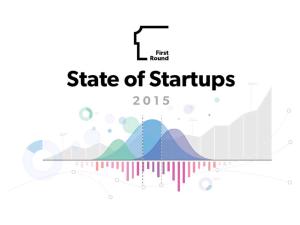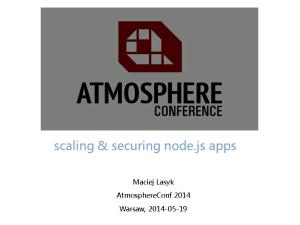- 本月热门
-
 2015年创业者调查报告(State of Startups) by FirstRound
2015年创业者调查报告(State of Startups) by FirstRound -
 JavaScript闭包你也懂
JavaScript闭包你也懂 -
 MongoDB Best Practices(最佳实践) by Jay Runkel
MongoDB Best Practices(最佳实践) by Jay Runkel -
 Scaling & securing node.js apps(扩展和加强NodeJS应用的安全性) by Maciej Lasyk
Scaling & securing node.js apps(扩展和加强NodeJS应用的安全性) by Maciej Lasyk -
 ASP.NET5快速入門[繁] by 小朱
ASP.NET5快速入門[繁] by 小朱 -
 Lua 在 Nginx 中的应用 by 章亦春@淘宝
Lua 在 Nginx 中的应用 by 章亦春@淘宝 -
 基于Node.JS的全栈开发 by 张雪峰@携程
基于Node.JS的全栈开发 by 张雪峰@携程 -
 去哪儿SPA(面向服务)分享 by 蔡欢@Qunar
去哪儿SPA(面向服务)分享 by 蔡欢@Qunar -
 指数级增长业务下的服务架构改造 by 梁宇鹏@环信
指数级增长业务下的服务架构改造 by 梁宇鹏@环信 -
 How Change Happens(如何拥抱变化,鼓励创新) by Openlab
How Change Happens(如何拥抱变化,鼓励创新) by Openlab
加收藏
Five Things You May Not Know About Bitcoin(关于比特币你可能不知道的5件事) by Brian Armstrong
第1页
Five Things You
May Not Know
About Bitcoin
by Brian Armstrong, Coinbase CEO
May Not Know
About Bitcoin
by Brian Armstrong, Coinbase CEO
第2页
Bitcoin is...
1. not having a crisis, it is having an election 2. 3. 4. 5.
1. not having a crisis, it is having an election 2. 3. 4. 5.
第3页
Bitcoin is debating...
● Small Blocks
○ BitcoinCore ○ decentralization > scale
● Large Blocks
○ BitcoinClassic ○ decentralization < scale
● Small Blocks
○ BitcoinCore ○ decentralization > scale
● Large Blocks
○ BitcoinClassic ○ decentralization < scale
第4页
And people are worried...
第5页
The Prevailing View
第6页
Reality
第7页
In an election there might be a lot of name calling, but in the end one person wins and we all remain one country.
第8页
Traditional Election vs Bitcoin Election
● Vote at ballot box ● New Person ● Every four years ● 51% or more
● Vote with CPU power ● New Features ● Can happen any time ● any threshold can be
used (over 50%)
● Vote at ballot box ● New Person ● Every four years ● 51% or more
● Vote with CPU power ● New Features ● Can happen any time ● any threshold can be
used (over 50%)
第9页
Bitcoin is...
1. not having a crisis, it is having an election 2. not splitting in two, it is upgrading 3. 4. 5.
1. not having a crisis, it is having an election 2. not splitting in two, it is upgrading 3. 4. 5.
第10页
Let’s say there is a 70/30 split...
Economic incentives push everyone to one version ● blocks mined on the minority fork are worth nothing ● coins spent on the minority fork plummet in value
Economic incentives push everyone to one version ● blocks mined on the minority fork are worth nothing ● coins spent on the minority fork plummet in value
第11页
In the past when we’ve seen a split...
● 99% of hashing power ends up on the longest chain within a matter of hours (not days, or weeks)
● Even a 50/50 split is a very unstable state that won’t last long (imagine balancing a see-saw). Half the miners are mining blocks that will end up being worth zero. Each is desperately trying to predict which fork will win so they can rush to the winning side (and stop losing money). About $10,000 every 10 minutes is at stake.
● 99% of hashing power ends up on the longest chain within a matter of hours (not days, or weeks)
● Even a 50/50 split is a very unstable state that won’t last long (imagine balancing a see-saw). Half the miners are mining blocks that will end up being worth zero. Each is desperately trying to predict which fork will win so they can rush to the winning side (and stop losing money). About $10,000 every 10 minutes is at stake.
第12页
Split hashing power is an unstable state...
第13页
That resolves itself with one winner
第14页
Bitcoin is...
1. not having a crisis, it is having an election 2. not splitting in two, it is upgrading 3. entering an era of multiple competing nodes 4. 5.
1. not having a crisis, it is having an election 2. not splitting in two, it is upgrading 3. entering an era of multiple competing nodes 4. 5.
第15页
Historically….
One team worked on bitcoin protocol: Bitcoin Core This led to: ● less customer choice ● more debates ● design by committee
One team worked on bitcoin protocol: Bitcoin Core This led to: ● less customer choice ● more debates ● design by committee
第16页
In the past few months, at least four new teams have emerged to challenge Core...
1. Bitcoin Classic - support from 5 devs (including 2 core devs), 20+ companies, majority of miners
2. Bloq - Jeff Garzik, ~$1M raised, team of ~5, for-profit 3. [redacted] - VC Backed existing bitcoin company who is now
developing/maintaining their own fork, with plans to release 4. BTCD - open source project in Go, been around 3+ years,
arguably higher quality implementation than the C++ forks
1. Bitcoin Classic - support from 5 devs (including 2 core devs), 20+ companies, majority of miners
2. Bloq - Jeff Garzik, ~$1M raised, team of ~5, for-profit 3. [redacted] - VC Backed existing bitcoin company who is now
developing/maintaining their own fork, with plans to release 4. BTCD - open source project in Go, been around 3+ years,
arguably higher quality implementation than the C++ forks
第17页
Bitcoin Nodes Will End Up Like Browsers, A Diverse Ecosystem
第18页
A healthy/diverse ecosystem will lead to...
● faster bitcoin protocol development with teams competing for market share
● more consumer choice
Bitcoin may still develop something like the internet’s IETF over time, but it is the browsers which decide which internet standards get implemented. Lack of multiple competing nodes (monoculture) is the single biggest thing holding back bitcoin’s development at this time.
● faster bitcoin protocol development with teams competing for market share
● more consumer choice
Bitcoin may still develop something like the internet’s IETF over time, but it is the browsers which decide which internet standards get implemented. Lack of multiple competing nodes (monoculture) is the single biggest thing holding back bitcoin’s development at this time.
第19页
Which bitcoin node will be the….
● Chrome of bitcoin
○ Incredible performance benchmarks ○ Sponsor with deep pockets
● Netscape of bitcoin
○ Early pioneer that fades ○ Invented most building blocks
● Internet Explorer of bitcoin
○ Questionable quality ○ Forced on people via monopoly
● Mozilla of bitcoin
○ Quirky/ideological ○ Die hard open source
“history doesn’t repeat itself, but it does rhyme” - Anonymous
Theory: the key to miner adoption will be performance benchmarks (such as block relay or validation times) that will give them an edge over competitors. They are purely rational actors focused on driving revenue.
● Chrome of bitcoin
○ Incredible performance benchmarks ○ Sponsor with deep pockets
● Netscape of bitcoin
○ Early pioneer that fades ○ Invented most building blocks
● Internet Explorer of bitcoin
○ Questionable quality ○ Forced on people via monopoly
● Mozilla of bitcoin
○ Quirky/ideological ○ Die hard open source
“history doesn’t repeat itself, but it does rhyme” - Anonymous
Theory: the key to miner adoption will be performance benchmarks (such as block relay or validation times) that will give them an edge over competitors. They are purely rational actors focused on driving revenue.
第20页
Can multiple teams/nodes exist if consensus is needed? Yes
Thought Experiment: Imagine you have 4 different nodes all speaking the same protocol, each with 25% market share. They can individually or in groups propose upgrades. If 3 of the 4 add a new feature and some threshold is reached (75%?) then the network upgrades. The remaining node which didn’t support the feature has a grace period to add it or their customers will need to switch. If only 1 or 2 nodes support a feature, but customers really want it, they can switch and the market share of the nodes will shift, potentially enough to reach the threshold.
Conclusion: Yes, consensus and protocol upgrades still work if you have a diverse set of nodes (just like web browsers and web standards). In fact, upgrades will happen faster because there are multiple teams developing many different ideas, competing for market share.
Thought Experiment: Imagine you have 4 different nodes all speaking the same protocol, each with 25% market share. They can individually or in groups propose upgrades. If 3 of the 4 add a new feature and some threshold is reached (75%?) then the network upgrades. The remaining node which didn’t support the feature has a grace period to add it or their customers will need to switch. If only 1 or 2 nodes support a feature, but customers really want it, they can switch and the market share of the nodes will shift, potentially enough to reach the threshold.
Conclusion: Yes, consensus and protocol upgrades still work if you have a diverse set of nodes (just like web browsers and web standards). In fact, upgrades will happen faster because there are multiple teams developing many different ideas, competing for market share.
第21页
Bitcoin is...
1. not having a crisis, it is having an election 2. not splitting in two, it is upgrading 3. entering an era of multiple competing nodes 4. on the cusp of an upgrade to 2MB blocks 5.
1. not having a crisis, it is having an election 2. not splitting in two, it is upgrading 3. entering an era of multiple competing nodes 4. on the cusp of an upgrade to 2MB blocks 5.
第22页
2MB blocks and BitcoinClassic
● solves bitcoin’s scaling problem (for the moment) ● has apparent support from majority of miners and bitcoin companies,
although TBD ● 2 experienced core developers Gavin Andresen and Jeff Garzik have
reviewed the code, making it a low risk option
● solves bitcoin’s scaling problem (for the moment) ● has apparent support from majority of miners and bitcoin companies,
although TBD ● 2 experienced core developers Gavin Andresen and Jeff Garzik have
reviewed the code, making it a low risk option
第23页
Announcement
BitcoinClassic is live as of this morning! https://github.com/bitcoinclassic https://bitcoinclassic.com/
BitcoinClassic is live as of this morning! https://github.com/bitcoinclassic https://bitcoinclassic.com/
第24页
Announcement
Coinbase is going to be supporting Bitcoin Classic.
Important to note: running Bitcoin Classic does not create any interoperability issues (remember, there is only one version of bitcoin at any given time, Coinbase will always support the longest valid chain in bitcoin). Bitcoin Classic’s 2MB upgrade only takes effect if 75% of the rest of the network agrees, so there is no such thing as a “contentious” hard fork.
Coinbase is going to be supporting Bitcoin Classic.
Important to note: running Bitcoin Classic does not create any interoperability issues (remember, there is only one version of bitcoin at any given time, Coinbase will always support the longest valid chain in bitcoin). Bitcoin Classic’s 2MB upgrade only takes effect if 75% of the rest of the network agrees, so there is no such thing as a “contentious” hard fork.
第25页
Watch the election in real time… https://coin.
dance/nodes or http://nodecounter.com/
dance/nodes or http://nodecounter.com/
第26页
Bitcoin is...
1. not having a crisis, it is having an election 2. not splitting in two, it is upgrading 3. entering an era of multiple competing nodes 4. on the cusp of an upgrade to 2MB blocks 5. the first time the world has seen a global financial
system that can be upgraded in real time
1. not having a crisis, it is having an election 2. not splitting in two, it is upgrading 3. entering an era of multiple competing nodes 4. on the cusp of an upgrade to 2MB blocks 5. the first time the world has seen a global financial
system that can be upgraded in real time
第27页
Upgrading protocols is difficult
Upgrade Times ● IPv4 -> IPv6 (7 years?) ● HTTP (3-16 years) ● Bitcoin could be the first protocol which gets upgraded every year (or less)
Upgrade Times ● IPv4 -> IPv6 (7 years?) ● HTTP (3-16 years) ● Bitcoin could be the first protocol which gets upgraded every year (or less)
第28页
Upgrading financial networks is tougher...
● SWIFT (10+ years?) ● ACH (20+ years?) ● Visa chip and pin (never?)
What if you could upgrade a global financial network every year? Bitcoin is the first network to offer this possibility.
● SWIFT (10+ years?) ● ACH (20+ years?) ● Visa chip and pin (never?)
What if you could upgrade a global financial network every year? Bitcoin is the first network to offer this possibility.
第29页
Bitcoin’s built in upgrade mechanism...
● is one of its most innovative features which should be celebrated, not feared
● is working as designed, in the same way an election process is still working even if there is name calling (debates about how to upgrade bitcoin will never go away, and that is ok - we have a voting mechanism to resolve it)
● will ensure Bitcoin continues to evolve/improve ● is a major advancement over any prior internet protocol or financial
network that we’ve seen
● is one of its most innovative features which should be celebrated, not feared
● is working as designed, in the same way an election process is still working even if there is name calling (debates about how to upgrade bitcoin will never go away, and that is ok - we have a voting mechanism to resolve it)
● will ensure Bitcoin continues to evolve/improve ● is a major advancement over any prior internet protocol or financial
network that we’ve seen
第30页
Conclusion
● The best thing we can do to ensure continued development of the bitcoin protocol is to encourage new nodes (and teams) to emerge
● Bitcoin Core is an excellent team who has contributed greatly to bitcoin (and they will continue to be one of the best teams) but they should not be the only team
● This will be the first of many elections and upgrades in bitcoin. Even if 2MB blocks win, it doesn’t mean BitcoinClassic wins. Any node can propose or add a change.
● Showing support for BitcoinClassic by running a node is the simplest way to help ensure bitcoin scales in the short term because it will help us enter a world of multiple nodes.
● Proof that bitcoin’s upgrade mechanism works (a successful hard fork) will cause the bitcoin’s price to go up because it will prove bitcoin can adapt to changes and evolve over time.
● The best thing we can do to ensure continued development of the bitcoin protocol is to encourage new nodes (and teams) to emerge
● Bitcoin Core is an excellent team who has contributed greatly to bitcoin (and they will continue to be one of the best teams) but they should not be the only team
● This will be the first of many elections and upgrades in bitcoin. Even if 2MB blocks win, it doesn’t mean BitcoinClassic wins. Any node can propose or add a change.
● Showing support for BitcoinClassic by running a node is the simplest way to help ensure bitcoin scales in the short term because it will help us enter a world of multiple nodes.
● Proof that bitcoin’s upgrade mechanism works (a successful hard fork) will cause the bitcoin’s price to go up because it will prove bitcoin can adapt to changes and evolve over time.
第31页
Thank You
Follow me on Twitter at @brian_armstrong
Help bitcoin scale by downloading a running a copy of BitcoinClassic today: https://bitcoinclassic.com/
Follow me on Twitter at @brian_armstrong
Help bitcoin scale by downloading a running a copy of BitcoinClassic today: https://bitcoinclassic.com/
